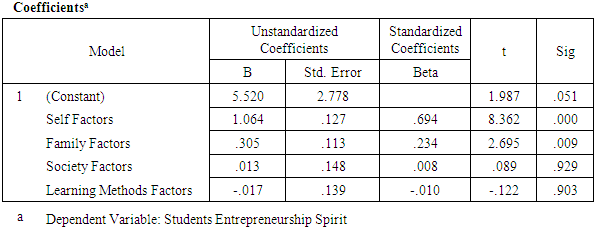-
Paper Information
- Paper Submission
-
Journal Information
- About This Journal
- Editorial Board
- Current Issue
- Archive
- Author Guidelines
- Contact Us
Microeconomics and Macroeconomics
p-ISSN: 2168-457X e-ISSN: 2168-4588
2017; 5(1): 22-25
doi:10.5923/j.m2economics.20170501.03

Entrepreneurial Spirit Developments of Local Students
Bambang Suroto1, Fatkhurahman1, Eka Armas Pailis2, Hadiyati1
1University of Lancang Kuning, Indonesia
2University of Riau, Indonesia
Correspondence to: Eka Armas Pailis, University of Riau, Indonesia.
| Email: |  |
Copyright © 2017 Scientific & Academic Publishing. All Rights Reserved.
This work is licensed under the Creative Commons Attribution International License (CC BY).
http://creativecommons.org/licenses/by/4.0/

The study program management is determined to produce graduates who spirited entrepreneur (entrepreneurship), the soul need to be identified and need to look for factors determinant, in a previous study and this study is a continuation of previous research, it is known that there are identifiable there are 8 (eight) the entrepreneurial spirit of students, among others: 1) a strong willingness to work (especially economics) with an independent spirit; 2) Ability to make the right decisions and take risks; 3) Creative and innovative; 4) Persistence; 5) Research; 6) Earning; 7) Working in a spirit of togetherness; 8) A sound business ethics. Once the material is given to the student entrepreneurship either theory or practice the results obtained are still not optimal although there are significant differences before and after the given material. To prove the hypothesis, then in this research using quantitative research using a sample of the final semester students with proportional random sampling method that is based on group learning and data were collected by questionnaire and analyzed by quantitative analysis using multiple linear regression analysis. Based on the survey results revealed that the determinant factors that influence the entrepreneurial spirit of students of management studies at the Faculty of Economics, University of Lancang Kuning of four variables, namely the factor of self, family factors, environmental factors society and factor learning method proved that the factors themselves and family factors that influence significant. While environmental factors of society and learning methods not significant.
Keywords: Yourself, Family, Community, Learning Method, the Spirit of Entrepreneurship
Cite this paper: Bambang Suroto, Fatkhurahman, Eka Armas Pailis, Hadiyati, Entrepreneurial Spirit Developments of Local Students, Microeconomics and Macroeconomics, Vol. 5 No. 1, 2017, pp. 22-25. doi: 10.5923/j.m2economics.20170501.03.
1. Introduction
- Entrepreneurship becomes foundation and basic of superior program in the management study program, as its realization, it is necessary to have a study that can be used to be considered in the development of curriculum of entrepreneurship in Management Studies Program of Economics Faculty of Lancang Kuning University. Previous research discussed about identification of entrepreneurship spirit in students and this research will reduce the determinant factors which influences the entrepreneurial spirit in order to obtain the actual information in decision making for Management Studies Program.Management study program is determined to produce graduates who have entrepreneurial spirit, this spirit needs to be identified and need to be searched for its determinant factor, at the previous research and current research is a continuation of previous research, it is known that there are 8 (eight) students entrepreneurship spirits which are: 1) A strong will to work (mainly in the economic field) with independent spirit; 2) Be able to make the right decision and dare to take risks; 3) Creative and innovative; 4) Diligent; 5) Thorough; 6) Productive; 7) Work with the spirit of togetherness; 8) Good business ethics. After the entrepreneurship lesson has given to the students either in the form of theory or practice, the results obtained are still not optimal although there are significant differences before and after the lesson.There are many factors that influence or become determinant factor of student entrepreneurship spirit, the importance of this determinant factor is to build and develop entrepreneurship spirit owned by students in the effort to achieve higher education graduates target. This condition is explained in the rules Permenristek Dikti No 44 year of 2015 about SNPT which affirmed that college graduates at level 6 which emphasize the formation of attitudes, knowledge and ability both general or special.The determinant factor gives the cause of the problem, some previous expert’s opinions as presented by Mopangga (2014: 89) that individual characteristics, family environment and sociodemography and academic support decides the high or low interest of student entrepreneurship. Then research results by Burhanuddin (2013: 1) explains that determinant factors of student entrepreneurship spirit are: teaching and learning process in the form of pratical learning center and practical based learning. Also delivered by Suharti (2011: 124) that socidemografi factors, attitude factors, and contextual factors becomes its determinant factors. According the synthesis by Mopangga (2014: 78); Burhanuddin (2013: 1) and Suharti (2011: 124), the determinant factors of student entrepreneurial spirit includes: self, family, community and learning methods.Student phenomenon in the Faculty of Management Studies Program of Lancang Kuning can be seen by the condition of individual student who enthusiastically follow entrepreneurship subject and also most (55%) students is motivated to choose management majors because they want to enter the world of work or private sector and also their family background nearly 60% came from farmers and traders families and the conditions of the teaching methods provided by lecturers entrepreneurship subjects apply 30% theory and 70% entrepreneurial practice.
2. Research Method
- Hypothesis testing is done by starting from determination coefficient shows that determinant factor (self, family, society and learning method) simultaneously influence entrepreneurship spirit of end semester student of semester VII management study program of Economics Faculty of Lancang Kuning University. The contribution can be seen from the R square value of 0.607 or 60.7%. This value indicates that 60,7% entrepreneurship student spirit variable can be explained by self, family, society and learning method variables, and 39,3% are influenced by other variables not examined in this research.More details of R square can be seen at the following table of determination coefficient:
|
|
|
 | Figure 1. Map of Research Location |
3. Research Result
- Based on the research result as described, can be discussed several things:1. The influence of self-factor on the student entrepreneurial spiritSelf-factor is a form factor inside an entrepreneur which in this case is a student factor, explained that through this self condition has its others element: self-concept that leads to what is to be achieved, then self-knowledge at work, the skills possessed, attitudes and behaviors in dealing with the real world and the problem of self-motivation in achievement. Self variables (8.362 > 2,000 = Ho rejected) this means that the self-factor affects significantly to the student entrepreneurial spirit. 2. The influence of family factors on the student entrepreneurial spirit.The family becomes an example and role model in the student, explained that the customs built in the house will bring someone into the future. The elements of the family itself, which are: the habits in the family in entrepreneurship, the expectations of parents, encouragement given by parents, real everyday examples. Family variables (2,695 > 2,000 = Ho rejected) this means that family factors have a significant effect on the student entrepreneurial spirit.3. The influence of social environmental factors on the student entrepreneurial spiritSociety is an environmental factor where someone sees real conditions and becomes an example for a person and also becomes a boost in building an entrepreneurial spirit. Its elements are: dynamic environmental conditions of the residence, peers, community habits and public perceptions of entrepreneurship. This family environment variable (0.089 < 2,000 = Ho accepted) means that the environmental factors of society have no significant effect on the student entrepreneurship spirit. In contrast to the results of previous research that the community environment gives a significant influence, but in the case of this student is known by their current society environment that is in the boarding house environment, then they establish relationships with the community only via social media, so they lack motivation in trying.4. The influence of learning method factors on the student entrepreneurial spiritThe learning method that is done in class together with the lecturer giving the lesson can be explained that about the giving of theory and practice to the students. Its elements include: practical synergy with student-centered method, explanation of lecture rules, lecture materials and proficiency of lecturers. The family variable (-0.122 > -2,000 = Ho accepted) this means that the factor of learning method has no significant effect on the student entrepreneurship spirit.
4. Conclusions
- This study yields a detailed conclusion as follows: (a). Partially factor of self, the family influence significantly to the student entrepreneurial spirit while society environment factor and learning method partially does not affect entrepreneurial spirit of end semester student of semester VII management study program of Economics Faculty of Lancang Kuning University and (b). Simultaneously the determinant factors (self, family, community, and learning method) have a significant effect on the entrepreneurial spirit of end semester student of semester VII management study program of Economics Faculty of Lancang Kuning University.
 Abstract
Abstract Reference
Reference Full-Text PDF
Full-Text PDF Full-text HTML
Full-text HTML

